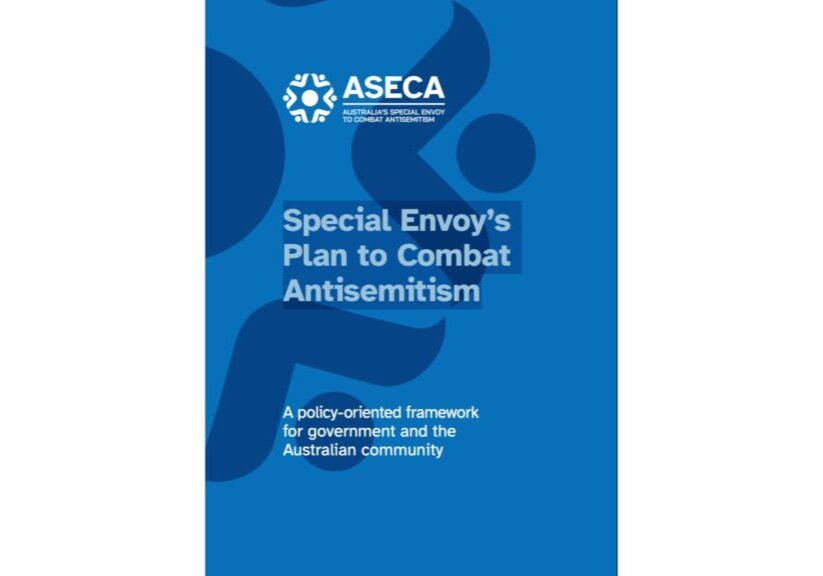Australia/Israel Review
Condemning antisemitism is no longer allowed
Aug 2, 2021 | Peter C. Herman

It seems you can’t condemn antisemitism anymore. On May 26, the Chancellor and the Provost of Rutgers University in New Jersey issued a statement condemning the precipitous rise in antisemitic incidents in the US: “We are saddened by and greatly concerned about the sharp rise in hostile sentiments and antisemitic violence in the United States. Recent incidents of hate directed toward Jewish members of our community again remind us of what history has to teach us.”
Given the sudden rise in antisemitic rhetoric (the Anti-Defamation League (ADL) tracked more than 17,000 tweets saying “Hitler was right,” or some variation thereof, between May 7-14) and antisemitic attacks both in the United States and abroad, you would think that the statement would be unexceptional, even welcome – especially since many universities and colleges issues similar statements condemning anti-Black and anti-Asian violence.
But no. A day later, the Chancellor and Provost issued “An Apology,” because “the message failed to communicate support for our Palestinian community members.”
Then, they replaced the original statement with this one: “Neither hatred nor bigotry has a place at Rutgers, nor should they have a place anywhere in the world. At Rutgers, we believe that antisemitism, anti-Hinduism, Islamophobia and all forms of racism, intolerance and xenophobia are unacceptable wherever and whenever they occur.”
Odd. Why does a statement condemning antisemitism need to be broadened to include other forms of racism and bias?
Then it happened again.
On June 10, the Society of Children’s Book Writers and Illustrators (SCBWI) published its own fervent condemnation of antisemitism: “The SCBWI unequivocally recognizes that the world’s 14.7 million Jewish people (less than 0.018% of the population) have the right to life, safety, and freedom from scapegoating and fear.”
Then things went sour.
First, the Executive Director, Lin Wood, abjectly apologised for the statement on the grounds that saying antisemitism is bad and that Jews have the right to live in peace hurts Palestinians: “I would like to apologize to everyone in the Palestinian community who felt unrepresented, silenced, or marginalized. SCBWI acknowledges the pain our actions have caused to our Muslim and Palestinian members and hope that we can heal from this moment.”
Then, the person responsible for the original statement, Chief Equity and Inclusion Officer April Powers, who happens to be both black and Jewish, resigned, but not before delivering her own apology for neglecting “to address the rise in Islamophobia, and [I] deeply regret that omission.”
In a subsequent interview, Powers said that her Judaism rendered her “inherently suspect.”
“You’re Jewish,” her critics said, so “you can’t be in a role like this.” Inclusion and equity, it seems, means exclusion and inequity for Jews.
This is just bizarre. How does recognising that Jews have the right to live in peace, that Jews have the right to eat in a restaurant without being attacked, as happened recently in Los Angeles, harm anybody else?
Would anybody say that protesting anti-Black violence neglects the rise in, say, anti-Asian violence? Why is antisemitism singled out for this sort of treatment?
These two incidents made national news in the US, but this also occurs below the national radar. My institution, San Diego State University, responded to a recent spate of antisemitic incidents, ranging from swastikas inscribed on buildings to the repeated vandalising of the local Chabad House, by organising a task force to address antisemitism. I’m on this task force.
We soon learned that an outside group of faculty, led by a Palestinian professor, was unhappy with the task force’s membership (predominantly Jews) and focus (exclusively antisemitism). So they asked the university’s president to appoint another member they had chosen: an outspoken opponent of Israel who blamed an earlier attack on Chabad on Israel’s actions against Hamas and claimed that the university’s partnership with the ADL to fight antisemitism signalled indifference toward Arabs.
By now, it’s common knowledge that antisemitism is not taken very seriously on the left. At first, this was blamed on Jews being “white” and therefore privileged. But in the wake of the war between Hamas and Israel, we see a new twist. Now, when there’s an antisemitic incident, Diaspora Jews are blamed, not the person who hates Jews.
We see this perfectly illustrated with my university colleague, who wrote on the College of Arts and Letters listserv that the attack on Chabad House was Israel’s fault because Israel responded to Hamas’ rockets: “It is highly disturbing that the message [condemning the Chabad House vandals] that was just sent out to the whole campus was sent without some contextualization about the current situation in Jerusalem and the 80+ jets that have just bombarded Gaza, killing 20 people, including 9 children, and toppling a 13-story (sic) building that covered a whole block.”
Never mind the 4,000-plus unguided rockets Hamas launched with precise intent and hope that they would kill Israeli civilians.
Antisemitism, in other words, cannot be condemned by itself, as can other forms of bias. Nobody, for example, sought to “contextualise” the recent murders of Asian women in Atlanta by referencing the Chinese Government’s treatment of the Uighurs.
In current woke discourse, you can condemn attacks on Jews only if you condemn attacks on Arabs and Palestinians as well. Not only is Jew-hatred blamed on the victim, but having the temerity to condemn hatred against Jews may cost you your job. And before you leave, you’ll have to write a Maoist self-criticism.
We know where this ends, and it’s not good.
Peter C. Herman is a Professor of English Literature at San Diego State University. His books include Unspeakable: Literature and Terrorism from the Gunpowder Plot to 9/11, and Critical Contexts: Terrorism and Literature. This piece originally appeared in the Jewish Journal of Los Angeles. © Jewish Journal (www.jewishjournal.com), reprinted by permission, all rights reserved.
Tags: Antisemitism, Media/ Academia






